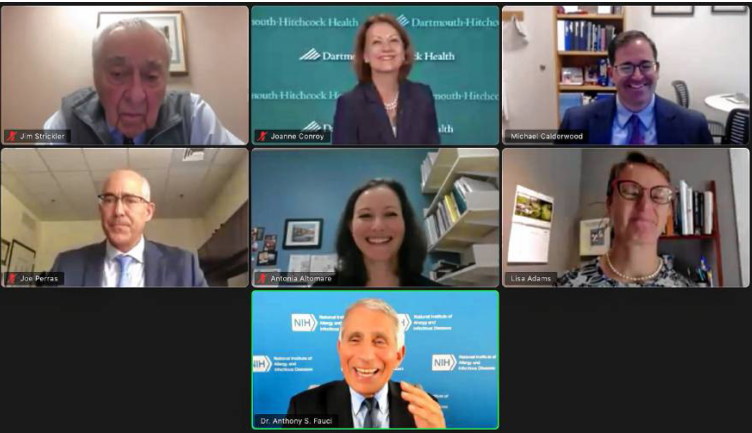Says ‘we’ve got to be very flexible’ in reopening schools
Dr.
Anthony Fauci, who has helped lead the national response to the
Covid-19 pandemic, told about 3,500 Dartmouth-Hitchcock and Geisel
School of Medicine employees and students during a Monday Zoom call that
leaders at the national level “cannot make one statement” about whether
and how to reopen schools.
Instead,
Fauci, who in his 36 years directing the National Institute of Allergy
and Infectious Diseases has advised six presidents, said that local
leaders need to weigh the risks and benefits of reopening schools based
on the levels of transmission in the community.
“We’ve got to be very flexible,” he said, during the lunchtime forum hosted by D-H CEO Joanne Conroy.
Fauci, who trained at what is now New York-Presbyterian/Weill Cornell Medical
Center in New York City with emeritus Geisel dean Dr. James Strickler,
who introduced him on Monday, addressed questions ranging from how to
safely reopen schools, to encouraging mask-wearing and getting people to
get a Covid-19 vaccine once it’s available.
Because
of the detrimental effects of keeping children out of school on the
children themselves and on their parents’ ability to work, Fauci said,
“[we] should try to the best of our ability to open the schools.”
But,
he said, doing so may not be safe everywhere. Cases in the Twin State
area are low. Vermont had one new case on Monday. There are six current
infections in Grafton County and five in Sullivan County, according to
the New Hampshire Department of Health and Human Services. But several
Hanover area residents have expressed concern about Dartmouth College’s
plan to bring back 2,200 undergraduates — about half its student body —
to campus next month.
‘Cautiously optimistic’
Dr.
Lisa Adams, a D-H infectious disease physician who is co-chair of the
college’s Covid task force, said during a panel discussion after Fauci
had signed off that Dartmouth officials have been carefully tracking the
case numbers in the region and the college’s plan relies on “robust
initial testing” in order to identify cases quickly and early. The plan
also relies on wastewater testing to identify dorms where students
may be infected, which will be done in conjunction with D-H, and many of
the school’s courses will be taught online, she said.
Still,
Conroy and others at D-H said they are preparing for an increase in
cases in the region as students return to Dartmouth and other schools in
the Twin States from across the country and overseas.
“An ounce of prevention is worth a pound of cure,” Conroy said. “I get used to wearing a mask everywhere I go.”

Shown
in a screen grab, Anthony Fauci, director of the National Institute of
Allergy and Infectious Diseases, at bottom, participates in a video
conference with, clockwise from upper left: Jim Strickler, emeritus dean
at the Geisel School of Medicine; Joanne Conroy, CEO and president of
Dartmouth Hitchcock Health; Michael Calderwood, associate chief quality
officer and regional epidemiologist at Dartmouth Hitchcock; Lisa Adams,
associate dean for global health and director of the Center for Global
Health Equity at Geisel; Antonia Altomare, a D-H infectious disease
physician and hospital epidemiologist; and Joe Perras, CEO and chief
medical officer at Mt. Ascutney Hospital and Health Center.
As
the country awaits a vaccine, which Fauci said he’s “cautiously
optimistic” will be ready early next year, he advised that people
protect themselves and others from the new coronavirus by wearing masks,
avoiding crowds and bars, keeping more than six feet away from others,
staying outdoors as much as possible and washing their hands.
In response to a question from Conroy about how to accelerate the public
acceptance of mask-wearing, Fauci noted that one obstacle is that young
people generally develop less severe symptoms, if any, from Covid-19,
which can make it difficult for them to take the virus seriously. In
addition, Fauci noted that wearing masks has become a political issue,
but he said “more and more people are accepting that” wearing masks and
avoiding crowds can help to blunt the current surge and to prevent those
in the future.
Looking
to the future, Dr. Antonia Altomare, a D-H infectious disease
specialist and epidemiologist, asked Fauci how the medical community can
encourage people to get the Covid-19 vaccine that is expected to be
ready by early next year.
Despite
the speed at which the vaccines have been developed, Fauci said he has
confidence in their safety and the scientific integrity of the process.
But
Fauci said the medical community has its work cut out for it in
informing the public of such a vaccine’s safety and necessity in
protecting public health, acknowledging the “anti-vaccine/anti-science
feeling in this country that we’ve got to overcome.”
Conroy,
the D-H CEO, said at the end of Fauci’s appearance that he was regarded
as a “rock star here in New Hampshire and Vermont,” and that she had
even seen “Fauci 2020” signs in the region.
This article is being shared by partners in The Granite State News Collaborative. For more information, visit collaborativenh.org.